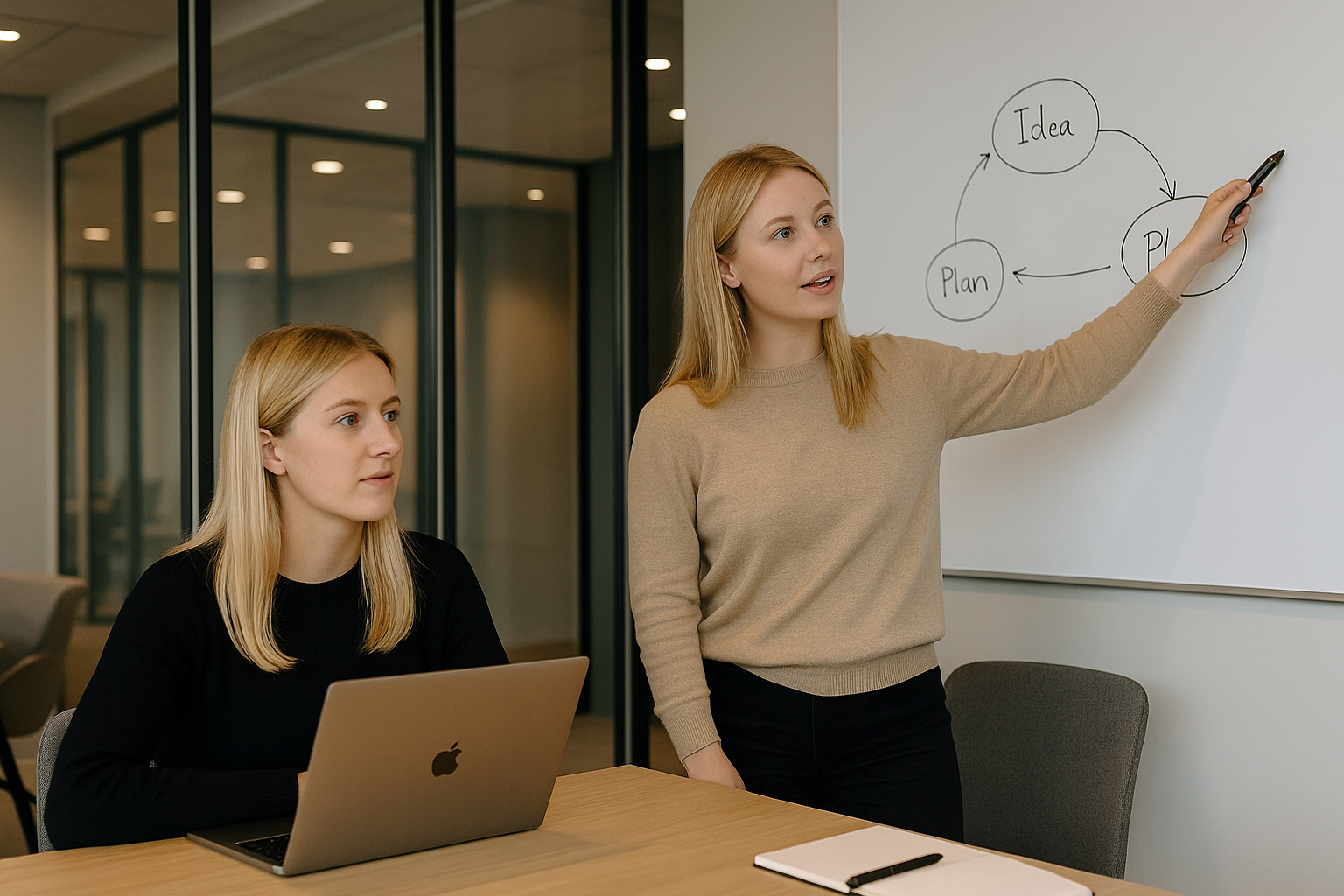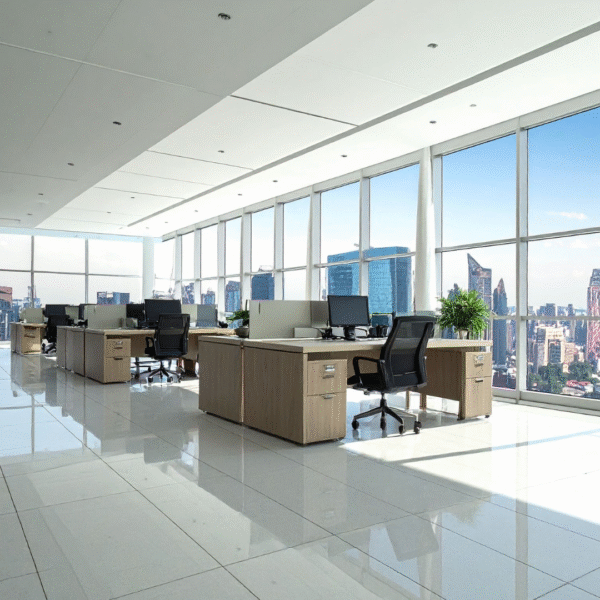Startups have always thrived on speed, agility, and timing. But in 2025, the rules of growth are being rewritten. Not just by market conditions or macro forces, but by AI itself.
AI isn’t just powering tech and digital products. It’s reshaping workflows, team structures, investment priorities – and perhaps most critically, how and where companies work.
That’s what this article is all about: the post-COVID, ripple effects of AI on office strategy, and what every founder, investor and operator needs to be thinking about right now.
AI is changing everything, including where we work
Across the UK and Europe, AI-native and AI-enabled startups are scaling faster than expected. According to CBRE, 18% of all European VC funding in Q2 2024 went to AI companies, with UK startups securing $2.1 billion in the first half of the year alone.
Many of the Onstage S25 Demo Day finalists reflect this trend – over 90% of the 103 finalists are building AI-first or AI-powered businesses, and this is expected to grow.
That makes 2025 a defining year for the AI startup ecosystem. But rapid growth has consequences. New teams. New workflows. New expectations. And a workspace market still catching up.

Office space is not dead. But it’s no longer default
The hybrid revolution has permanently shifted expectations. In the US, Korn Ferry data shows 65% of global workers would prefer at least a partly remote model, even as 64% say they’re being pushed back to full-time office presence. This dissonance is creating cultural friction inside fast-growth startups. And it’s much the same in the UK.
Layer in the widespread displacement of administrative and back-office roles, plus the rise of agile, flatter teams – and the result is a workspace mismatch. Many companies are still paying for offices sized for pre-AI headcount and old-world workflows.
It’s a huge shift, much like the impact COVID had suddenly on the office market in 2020, and this shift won’t spring back to ‘normal’ this time either. With AI changing everything at an unbelievable pace, there is no such thing as ‘normal’ anymore.
What’s replacing the traditional lease? A new model built around adaptability
The best founders are thinking differently. They’re:
- Designing space around collaboration, not just occupancy
- Choosing shorter, more flexible terms to reduce downside risk
- Leveraging usage data to refine how teams engage with space
- Using workspace as a brand and culture amplifier, especially for hiring
The most progressive setups are modular, adaptable, and integrated with how teams actually work. These are spaces where software engineers, AI researchers, commercial leads, and ops teams can collaborate, iterate and build momentum.
San Francisco is already there. London is catching up.
In San Francisco, AI startups have accounted for 25% of total office leasing since 2023. The city’s infrastructure is evolving to support AI-specific needs: lab space, collaboration hubs, shared R&D facilities. In London, clusters around Kings Cross, Southbank and Shoreditch are seeing similar patterns emerge.
But the UK market is different. Supply can be trickier to unlock. Legacy leases dominate. And most traditional office brokers are still optimised for long-term corporate tenancies – not the dynamic needs of VC-backed startups with a 12-month AI transformation plan (which could lead to in-house team changes).

What investors are watching – and why space is now strategic
Investors know that workspace is more than logistics. It’s operational context. It impacts hiring, onboarding, retention, brand, and burn.
In pitch meetings, VCs are increasingly scrutinising:
- How startup teams are structured for AI-scale work
- Whether spend on workspace reflects runway discipline
- How space supports velocity, creativity, and culture
Done well, workspace becomes a signal of focus. Done poorly, it’s a distraction, cost centre, or worse, a growth constraint.
Four themes defining AI workspace strategy in 2025
- Hybrid as a baseline, not exception
Startups are no longer debating whether to embrace hybrid, that was 2021 thinking. The office workspace is back, the challenge now is picking a flexible option you can grow with and designing it well. This means intentional space planning: building magnet-like offices to attract talent (especially in the AI space), not mandatory HQs. - Right-sizing in a world of automation
With back-office roles reducing or getting automated, companies are reducing desk counts and prioritising team-based zones and meeting-led layouts. - Data-driven workspace decisions
AI-powered analytics are helping founders and HR teams understand actual usage patterns and optimise floorplans, contract lengths, and layout design accordingly. - Flexibility as risk protection
With AI talent in high demand, teams scale (and shrink) fast. More than ever, startups are prioritising flexible terms and scalable fitouts, over fixed leases.
This isn’t just a startup issue. It’s a systemic shift.
CBRE, Korn Ferry and even UBS are all highlighting that AI’s impact on commercial real estate is still unfolding. Some sectors will shrink their footprint. Others will expand. But what’s clear is that fixed office workspace strategies are increasingly misaligned with how modern companies evolve.
Even mid-size businesses and multinationals are shifting to flexible models: activity-based environments, ESG-optimised locations, and modular designs that can flex with headcount.
What should founders and operators do right now?
Ask three big questions:
- Is our workspace helping or hindering execution?
- Is our current setup aligned to how our team actually works?
- Are we losing flexibility and wasting money on the wrong type of space?
If the answer to any of these is unclear, it’s time to reset.

Final word: workspace is now a product decision
AI is driving faster decision-making, faster growth, and faster cycles. That same speed must apply to how founders think about space.
The smartest startups are already acting. They’re treating workspace as a growth lever, not a sunk cost. And they’re building flexible, affordable environments that match the ambition, adaptability, and pace of the teams inside them.
This is what modern workspace strategy looks like. And in 2025, it could be the edge that sets you apart. We call it the ADAPT difference – find office space to power your growth today.
ADAPT is proud to be supporting the Onstage S25 cohort, helping startups across the UK find smarter, better-matched office space strategies that flex with their growth. Read more here.






